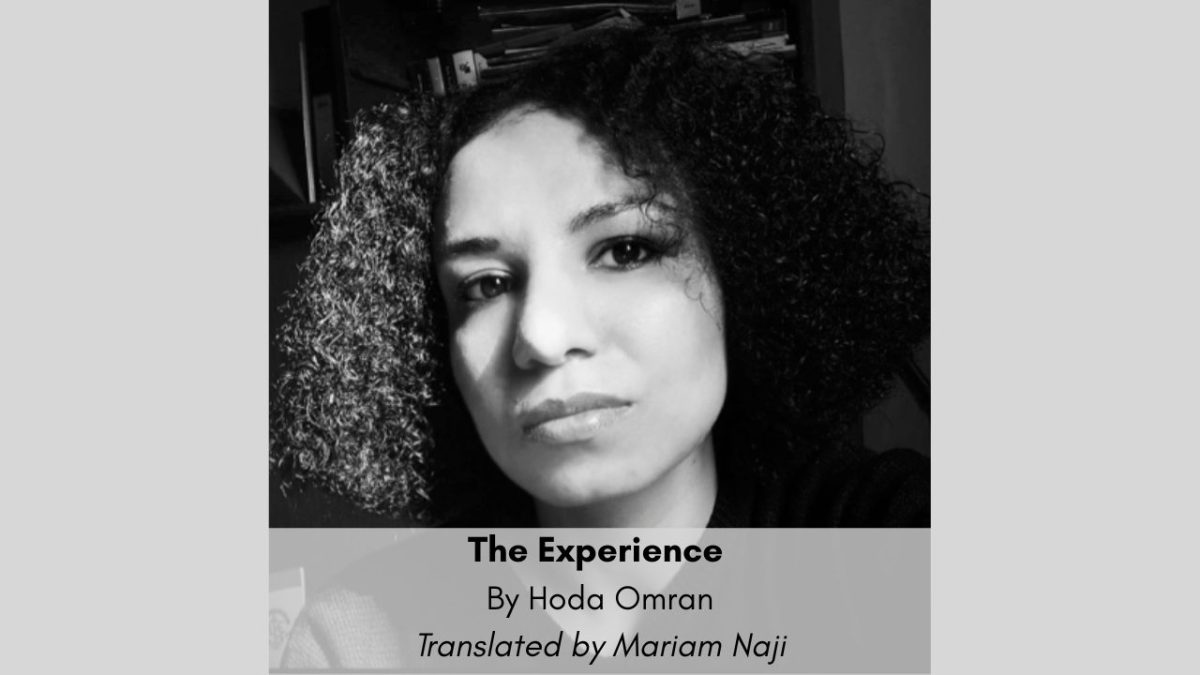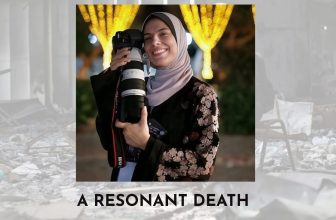
This is the first of two poems we will publish by Hoda Omran (pictured left), in Mariam Naji’s translation (pictured right). The second, “Love,” will appear next week.
The Experience
By Hoda Omran
Translated by Mariam Naji
Dear death, you will survive.
You will run across these sweltering lands
toward the free souls,
sweeping them into your eager embrace.
We sleepers, in lakes of insomnia at night.
We, the broken ones, misused in childhood.
Too sentimental, to the point of melting out on roads.
We, who are forever deprived of something magical and mysterious,
will cross to the other side
and then will weave, from you, an eternal image of pleasure and torment.
…….
In the morning, Cairo pelts us with its ghosts
Creatures that hover around my deranged mind.
They are the city’s true children,
their skins yellowish and slimed.
Their eyes dull and plain.
Their hearts are made of cheap, dazzling fabric
that holds nothing.
Even cities
that are blind
can see the fog, the cold, the melancholy.
And all these things—
fog, cold, and melancholy—
are the children of Death.
Death is an ancient god, feet firmly planted
on the ground.
Death has his own deep seas—his lovers, his disciples—
and we won’t argue about that.
We all face Death, and we walk with Him in these streets.
Except those without ancient souls,
with neither death, nor life.
They, one day, mounted our backs and traded our eyes for bread.
We are the children of Life, misfits of the margins.
We knew that it was not only illusion
that guided our blindness,
But corruption, too.
…….
The city is soaked in chill,
And hearts have withered,
Drowning in lead that turned to fire
in lovers’ eyes.
In the places where I wanted to love
so many people in,
to gift them my joy and shatter them with my departure,
Then to be shattered over them, too.
All these dead would have been my lovers,
would have been my children.
But my generous hand,
with which I would have patted their heads,
became a brutal hand
and their tiny tummies were forever filled with hunger.
Their bones became naked.
The earth did not cover them.
Yet this wreckage of humans felt no shame
and I still walk here,
turning Cairo into a loaf of bread, a bed, a companion.
….
My city is full of barking
as if it were our shared memory
howling out there, in the cold.
These are Cairo’s stray dogs,
chasing down hope—
even if they traded it all for agony and naïve songs—
in the back streets,
in savage fights,
with police, religion, family.
As if we had drunk down the experience in one swallow:
to be defeated together,
and despair won.
Hunger will seize us to the end of times;
it was a fucking game of chance.
أيها الموت ستنجو ستركض في هذه الأراضي الساخنة
نحو الأرواح الحرة
وتحتضنها بكل شوق
نحن النائمون في بحيرات الأرق على الليل
المعطوبون من سوء الاستخدام في الصِغر
العاطفيون لدرجة إذابتنا على الطرق
المحرومون دائمًا من شيء غامض وساحر
سنعبر للضفة الأخرى
وننسج منك صورة أبدية للمتعة والعذاب.
……
في الصباح، ترمي القاهرة أشباحها علينا
كائنات تحوم حول عقلي المجنون
هؤلاء أبناء المدينة الحقيقيون
جلودهم هلامية وصفراء
عيونهم باهتة وتافهة
هذه القلوب من قماش رخيص ومبهرج يحوي داخله لا شيء
وحتى المدن
وهي العمياء
تقدر على رؤية الضباب والبرد والوَحشة
وكل هذه الأشياء “الضباب والبرد والوَحشة” أبناء الموت
والموت إله قديم، يرسو بأقدام ثابتة على الأرض
وله بحاره العميقة، محبينه ومريديه ونحن لن نجادل في ذلك
كلنا نحوي الموت ونسير به في هذه الشوارع.
لكن هؤلاء الذين بلا أرواح قديمة، بلا موت ولا حياة
ركبوا يومًا ما فوق ظهورنا وقايضوا عيوننا بالخبز
نحن أبناء الحياة، أبناء الهامش والغرابة
عرفنا أن ليس الوهم فقط
مَن يمسك يد العمى،
الانحطاط أيضًا.
…
المدينة غارقة في البرد
والقلوب خرجت ذابلة
غارقة في الرصاص الذي تحول لنار في عيون الأحبة
في الأماكن التي وددت أن أحب فيها
أشخاصا كثيرين
أن أهبهم فيها كل سعادتي وأحطمهم على فراقي
وأتحطم عليهم
كل هؤلاء الموتى كانوا سيصبحون عشاقي
كانوا سيصبحون أولادي
ويدي الكبيرة التي كنت سأضعها على رؤوسهم بحنان
أصبحت يدًا غاشمة
بطونهم الصغيرة ملأها الجوع للأبد
وعظامهم تعرت
لم تسترها الأرض
وهذا الرُكام من البشر لم يخجل
وأنا مازلت أمشي هنا
وأجعل من القاهرة رغيفًا وسريرًا ونديمًا.
……
مدينتي مليئة بالنباح
كأنها ذاكرتنا جميعًا
خرجت لتعوي في البرد
هذه كلاب القاهرة التائهة
كانت تركض خلف الأمل
– حتى لو باعت كل شيء بالألم والغناء الساذج –
في شوارع خلفية
في معارك متوحشة،
مع البوليس والدين والعائلة
كأننا شربنا التجربة على مرة واحدة،
لننهزم جميعًا
ويكسب اليأس
الجوع سيحتلنا للأبد
كانت لعبة قمار بنت حرام.
….
Hoda Omran is an Egyptian poet, novelist, editor and researcher. She studied political science at Cairo University and is completing a master’s thesis on cultural policies and feminist literature. Her published works include the poetry collection Naive and Sentimental (2016), with selected poems translated into Swedish and English. the novel Fish, Orange, Weed (Dar Al-Saqi, 2018), which received a grant from the Arab Fund for Arts and Culture (AFAC) and was shortlisted for the Sawiris Award in 2021; and the poetry collection Cairo (2022), General Egyptian Book Organization, poetry series), winner of the Helmy Salem Prize for Poetry. She has also published the poetry collection As If It Were Forgiveness (Safsafa, 2023) and the short story collection Violent Love (Kotob Khan, 2024). Her young adult novel project The Gamer’s Life received a Mophradat Writing Sabbaticals grant in 2021. Hoda has also been awarded an AFAC grant for 2025 for her upcoming research project on poetry, fatherhood, and servitude in Upper Egypt.
Mariam Naji is a literary translator. Holds her BA in English Literature from Assiut University (2019), she is currently pursuing an MA in English and Comparative Literature at the American University in Cairo. She has published two full-length translations with Aseer Alkotb; Maid: Hard Work, Low Pay, and a Mother’s Will to Survive by Stephanie Land (2023) and The Guest List by Lucy Foley (2023). Mariam co-translated two other works; How a Feminist Movement is Made in the Kitchen by Elles Publication (2023) and Arabic, Between Love and War, published by Trace Press (2024). She participated in two translation programs; the British Centre for Literary Translation Summer School (2024) and the Arabic Translation Mentoring Program by New Writing North (2021). She loves to walk, dance, and sometimes to sit in silence.





